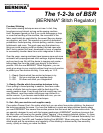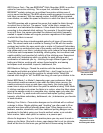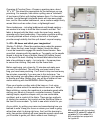
Preparing A Practice Piece—Prepare a practice piece, about
18” x 18”. This should be appropriate for the technique you are
practicing. For example, free-motion quilting uses a “sandwich”
of two layers of fabric with batting between them. For free-motion
sashiko, use lightweight interfaced denim with tear-away stabi-
lizer, and for free-motion bobbinwork, use a medium weight firmly
woven fabric such as cotton, linen, or lightweight wool.
Some techniques – including bobbinwork and thread painting –
are worked in a hoop to hold the fabric smooth and taut. The
fabric is hooped with the fabric under the inner hoop, exactly
opposite as for hand embroidery. Free-motion machine quilting
is usually stitched without a hoop as the bulk of the layers
provide enough stability that the quilt doesn’t require hooping.
3—GO—Sit down and stitch your imagination!
Starting To Stitch—Place the practice piece under the presser
foot. Lower the foot; even though it doesn’t touch the fabric,
it must be lowered to engage the needle thread tension. Sew
one stitch, stopping with the needle up. Tug gently on the needle
thread to bring up a loop of bobbin thread; pull bobbin thread
to the top of the work. Holding the thread tails behind the foot,
take a few stitches in nearly – but not quite – the same place
to secure the stitching. Stop and clip the thread tails.
Before continuing, set a timer for 15 minutes and make sure
you won’t be disturbed. This will help you keep track of how
long you have been practicing. You’ll want to stop and rest every
few minutes, especially if you are new to this technique. You
may be tensing your shoulders without realizing it; just remember
to breathe and relax. Before long, you will be a master at free-
motion stitching with the BERNINA
®
Stitch Regulator.
Place your hands on either side of the hoop or, if not using
a hoop, on either side of the needle area to serve as a “hoop”.
Begin stitching, running the machine at a moderate speed while
moving your hands in a smooth, controlled manner. Practice
making simple, repetitive shapes until you are comfortable,
confident, and in control of the fabric. There are two methods
of starting the machine: foot control and the Stat/Stop Slide on
the front of some models. Try both to see which is best for you.
As you stitch, try writing your name and remembering how you
learned to write. Keep your focus on where your hand is going
rather than what it is doing right now. And, just like learning to
write, free-motion stitching will soon become second nature and
you’ll be able to guide your fabric without over thinking it.
BSR compatible models (top to bottom):
aurora 440 QE, artista 630, artista 640,
and artista 730. Note: artista 200 is
BSR compatible when equipped with
the Upgrade Kit.





